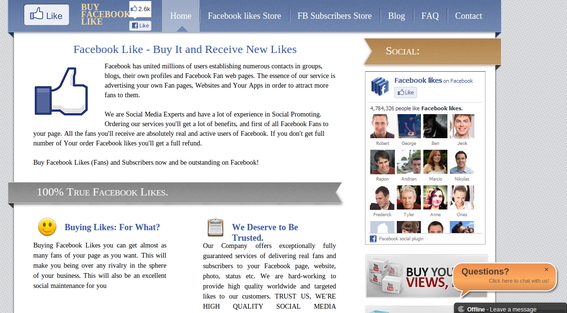Ecommerce marketing can be competitive, as each online store strives to build customer relationships, boost incoming site traffic, and sell more.
From time-to-time, marketers will step over an ethical line — sometimes without even realizing it. What follows are four tempting, but evil, marketing tactics that legitimate marketers should avoid.
Cherry Blossoming
Cherry blossoming is the practice of buying social media followers and fans. The term has it origins in Japan, where companies, sports teams, and minor celebrities can hire professional fans, called sakura, meaning cherry blossoms.
In social media terms, cherry blossoms can be real Facebook or Twitter users who are paid to like or share a company or its posts, or they might be bot generated accounts built for the sole purpose of boosting a marketer’s social media clout.
There are dozens of companies that sell social media cherry blossoms online.
Marketers that use this tactic presumably believe it makes their companies seem more trustworthy, and may convince more real and potential customers to enter contests, sign up for newsletters, and eventually become paying customers.
An online retailer of boots and shoes suddenly has nearly 11 times as many Facebook fans as Zappos. While this could be the result of some serious social media marketing, it might also be cherry blossoming.
Instead of trying to buy an audience, consider using contests, offers, and interesting content to attract fans and followers.
Link Farming
Link farming is the practice of setting up dozens or even hundreds of small sites or blogs for the sole purpose of linking back to a particular retail site in the hope of improving that retail site’s search engine ranking.
One instance of link farming is when retailers hire professional bloggers or writers to each maintain several blogs that write articles about or reviews of the products that the merchant sells and then links directly to the merchant.
This tactic seeks to trick search engines into thinking that the retailer’s site is more authoritative and important than it actually is.
Instead of link farming, considering posting good content directly on the retail site or the retailer’s blog.
Paid Customer Reviews
Customer reviews have been shown to influence sales. Shoppers trust opinions from their peers more than they trust product descriptions.
Unfortunately, some marketers take advantage of this, either purchasing reviews, trading for reviews, or even possibly faking reviews.
As an example, Overstock.com received criticism for offering college students a 10-percent off coupon for reviewing products. Organizations that promote ethical marketing believed that this was the same as buying reviews.
In early 2012, VIP Deals, an Amazon Marketplace merchant, was chastised for refunding customers who wrote positive reviews of their products.
It is far better to simply encourage shoppers to write reviews rather than trying to barter for them.
Link Buying
Inbound links may help a site perform better in search engine results. Some unethical marketers will do almost anything to get more inbound links, including offering to buy them.
In link buying schemes, marketers pay either individual sites or networks of sites to embed links into articles that may or may not be related to the retailer’s products. The main goal is to link keywords back to the retailer.
As an example, an article might be discussing shoe design and each time the word “shoe” is mentioned that word could link back to the retailer.
In some cases, link buying is done via a writing agency, where the agencies contact reputable blogs or news sites and offer to write articles for free. The articles will be on topics that the publication assigns, but will include a link or two to the agencies clients.
Rather than buying links, merchants should focus on creating their own content that actually merits readers and attention.




